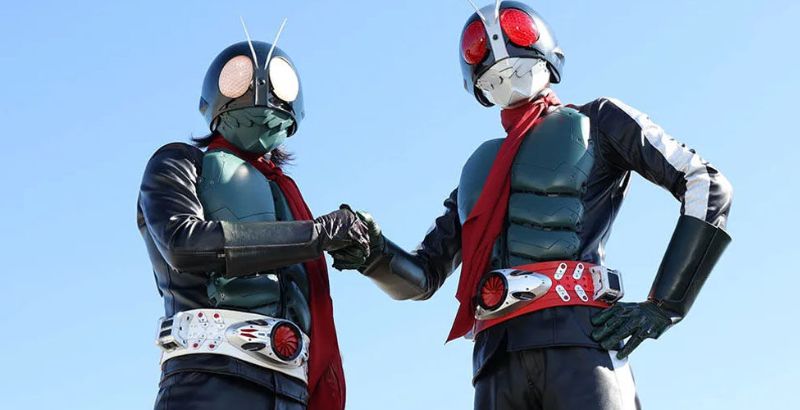In the realm of the Japanese superhero genre, “Shin Kamen Rider” takes a little time to find its stride and establish its unique rhythm. Penned and directed by Hideaki Anno, renowned for his work on “Neon Genesis Evangelion,” the film launches with a whirlwind of events in its opening half-hour. This initial flurry mirrors the optimistic essence of Takeshi Hongo (Sosuke Ikematsu), a motorcyclist protagonist who metamorphoses into the grasshopper-themed mechanical rider known as Kamen Rider.
As the narrative unfolds, viewers encounter a blend of unconventional choices, including subpar special effects, a glossy handheld visual style, abrupt cuts, and unorthodox camera angles. These stylistic elements are intentional, akin to Anno’s previous works such as “Shin Godzilla” and “Shin Ultraman,” collaborations with Shinji Higuchi. Comparatively, “Shin Kamen Rider” appears to have the smallest budget among the trio, potentially causing the distinctive approach to appear more like a flaw than a deliberate feature. Yet, as the story progresses, these seemingly disparate elements harmonize with the central character’s skewed, youthful, and sometimes romantic perspective.
Anno’s interpretation of Kamen Rider’s world manifests as a loving and idiosyncratic deconstruction of the classic hero archetype. Kamen Rider, a valiant young figure dedicated to thwarting the villainous SHOCKER organization and their array of animal-human hybrids, becomes the centerpiece of “Shin Kamen Rider.” Following a reluctant yet visceral encounter with beret-clad SHOCKER henchmen and a spider-like robot (Nao Omori), Hongo embarks on an anti-SHOCKER quest.
The story unfolds as Hongo engages with the icy monster-hunter Ruriko (Minami Hamabe) and her father, Dr. Midorikawa (Shinya Tsukamoto), a disillusioned scientist who once created insect-men for SHOCKER. Dr. Midorikawa’s dramatic shift leads him to oppose the very organization he once served and to bestow Hongo with superhuman abilities to combat SHOCKER. However, his early demise sets the stage for a transformative journey undertaken by Ruriko and Hongo, supported by enigmatic government agents Taki and Tachibana (Takumi Saitoh and Yutaka Takenouchi).
A significant portion of the film is devoted to Hongo’s internal struggle to uphold his principles while aiding others. This internal conflict intertwines with his computer-programmed instincts, which lean towards brutality. Each confrontation with an insect-themed adversary reshapes the mission, personalizing the stakes. The ultimate antagonist, Ruriko’s power-hungry brother Ichiro (Mirai Moriyama), a butterfly-monster and SHOCKER’s leader, encapsulates this shift.
Anno ingeniously manipulates the audience’s connection with the once-simplistic characters. He employs close-ups, dynamic cuts, and enlarges key visuals, all of which create an immersive sense of disorientation in sync with Hongo’s adrenaline-charged experiences. Even encounters with creatures like a hybrid praying mantis and chameleon (Kanata Hongo) become emotionally resonant.
While some might find the film’s pacing sporadic, action choreography unsophisticated, and special effects unrefined, Anno’s vision resonates through its experimental spirit and existential questioning. Echoing the themes of his “Shin” reboots and his iconic “Neon Genesis Evangelion” series, the movie addresses the struggle for identity within a collective purpose. Expectations for Anno’s touch are met with a unique perspective that explores the essence of the titular hero.
For enthusiasts of action-packed narratives, reimagining their perception of a bug-themed motorcycle hero equipped with a pinwheel-activated belt buckle becomes necessary. Anno navigates the delicate balance between admiration and innovation, crafting a closing act that seamlessly ties loose ends and recasts the film’s initial turbulence in a gentler light. These action sequences evolve into metaphors for Anno’s and his characters’ endeavor to redefine their roles in a mechanized world.
In stark contrast to formulaic American superhero films, Anno’s discernible touch shines through. “Shin Kamen Rider” maintains its allure, blending Anno’s distinct style with a heartfelt portrayal of the hero’s restless spirit. This superhero tale about a grasshopper-themed man on a bike transcends expectations, proving that even the unlikeliest of narratives can evoke profound emotions.

